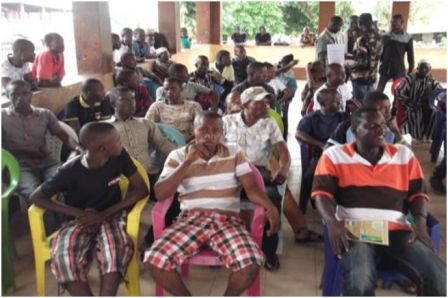DADA-SL completes project on use of Public Funds in Kambia & Port Loko
Democracy and Development Associates-Sierra Leone (DADA-SL) has informed this medium about the report of the Non-State Actors (NSAs) Fund on the implementation of the project titled ‘Increasing Transparency and Accountability in the Use of Public Funds and Management and Service Delivery Monitoring at Community Level’ in Kambia and Port Loko Districts. (Photo: A community training session on how to participate in community development processes at the Port Loko Community Barry)
The report was submitted to the Integrated Public Financial Management Reform Project (IPFRMP) through the NSA National Secretariat on George Street in Freetown.
The title of the project was ‘Increasing Accountability and Transparency in Public Funds Expenditure and Financial Management and Service Delivery at Community Level covering the period 1st July- 30th September, 2013.
The objective of the project was to enable NSAs, Ward Development Committees (WDCs) and District Budget Oversight Committees (DBOCs) in Port Loko and Kambia Districts develop skills on their roles and responsibilities.
Six consultative meetings were held with stakeholders in the six targeted Chiefdoms in Kambia and Port Loko Districts to sound their opinions about the project.
18 community sensitization, mobilization/town hall meetings were organized to monitor the use of public resources.
A two-day training was organized on the use of public funds and service delivery monitoring and the specific roles and responsibilities for Ward Councilors, Community Service Providers and traditional authorities in addition to developing the skills of NSAs, DBOCs and WDCs in monitoring public expenditures and service delivery at community level in Port Loko and Kambia Districts.
On the activities linked to the objectives of the project, DADA-SL developed service delivery monitoring tools, organized a two-day training on the use of public funds and service delivery monitoring and the specific roles and responsibilities of DBOCs, NSAs, WDCs and other CSOs at community level.
DADA-SL also monitored service delivery at Chiefdom level by Chiefdom Committee members to enhance transparency and accountability between duty bearers and their communities.
Other activities included three radio programs on the findings of the monitoring report and recommendations from the dialogue meetings and also ongoing projects in the various communities, two Transparency and Accountability Platforms established to monitor the use of public funds and effective service delivery at District level in Kambia and Port Loko Districts in addition to the drafting of the Terms of Reference.
Furthermore, six consultative meetings were held with stakeholders in the six targeted chiefdom headquarter towns of Kambia and Port Loko Districts, 18 community sensitization/town hall meetings on public financial expenditure and service delivery involving NSAs, DBOCs, Ward Councilors and WDCs and a two-day training workshop on the use of public funds and service delivery monitoring as well as the responsibilities of DBOCs, NSAs, WDCs and other CSOs at community level in Port Loko District.
Also, three radio sensitization programs were held in community radio stations to raise the peoples’ awareness on the use of public funds and service delivery monitoring at community level in Kambia and Port Loko Districts, two publications in local newspapers on the use of public funds and effective service delivery monitoring at community level and establishment of six Community Volunteers Public Funds and Service Delivery Chiefdom Monitoring Committees.
Two District Transparency and Accountability Platforms were also setup in Kambia and Port Loko Districts and the terms of reference drafted and developed, increased awareness on accountability and transparency on the use of public funds and service delivery in communities in Kambia and Port Loko Districts and increased knowledge and understanding of budget processes.
The trainings have resulted to increased involvement and participation of the people in monitoring the use of public funds and service delivery at community level.
Before the commencement of the activities of this project, the use of Non-State Actor mechanisms to monitor both state and non-state service providers and the use of public finances were lacking in Kambia and Port Loko Districts.
The capacity of local community structures and stakeholders was very weak to effectively monitor public financial management and service delivery systems.
Following the end of the eleven years civil war, working through local structures to move resources down to community level, stimulate demand for services, monitor service providers and promote positive political and social change have been at the center of pro-poor growth and human development outcomes.
Without doubt, activities of this project have created the platform and enabling environment for effective information sharing on the use of public resources and monitoring of service delivery by the duty bearers at the local level in the two Districts.
According to DADA-SL, lessons learnt from implementation of the activities include the generated inspiration, motivation and good practices for an effective public financial management and service delivery in decentralized governance structures, the foundation for future work created, creation of an experience-oriented basis on which to choose between specific approaches and promoting learning processes and capacity building for duty bearers and community members to be directly involved in the monitoring of service delivery processes in their localities.
The Millennium Development Goals (MDGs) target represents a global commitment to realize the rights of the poor to services and livelihood opportunities but these targets will not be met without increased access to services and an accountable public financial management.
Also, quality service delivery and an efficient and accountable public financial management may offer an entry point for triggering longer-term pro-poor social, political and economic development of the country.
Quality service delivery and an efficient public financial management may help to prevent communities and countries like Sierra Leone from sliding back into conflict by addressing its structural causes.
Effective service delivery interventions can provide an entry point and trigger for longer-term pro-poor social, political and economic change and development in communities in Port Loko and Kambia districts.
Effective and quality service delivery can mitigate social exclusion (officially or unofficially enforced), particularly in marginalized areas such as rural/deprived and poorly communicated territories by the existence of mechanisms that reach down to community level and give the poor/marginalized voice the opportunity to participate in services that benefit them.
Enhancing the capacity of community structures and stakeholders in the public finance and service delivery process is a powerful move to ensure accountability and transparency in the use and management of public funds and service delivery in the project target Districts.
As outlined in the reports, the trained community individuals and structures will work as a community monitoring mechanism where each community member acts as a watchdog to ensure that nobody or service provider misuses allocated public funds for development activities in their Districts.
Furthermore, barriers to poor people’s access to and participation in basic service processes were removed and their voices strengthened to move development resources to the community level.
The project has created the need for relationships of accountability between communities, service providers and policy-makers.
Lessons learned from the project activities have been shared widely with other NSAs and civil society actors in Sectorial and Regional Coordination Meetings.
Furthermore, the activities have created an opportunity for NSAs and other CSOs to agree on systemic approaches necessary to tackle grassroots participation and transparency in service delivery and public finance monitoring in the country.
Highlighting challenges, DADA-SL enlightened that the development of an inclusive and standard monitoring tools and fostering of innovations to increase quality service delivery were difficult due to the extremely low capacity of project participants in the subject matter.
The poor road conditions leading to project targeted communities made the implementation of project activities very difficult and completion of activities on time in addition to the heavy rains that also greatly affected the mobilization, attendance and timely completion of planned activities.
The development of innovative products and delivery mechanisms are critical to meeting the needs of communities and District actors in monitoring the type and quality of social, economic and political services at local levels.
The development and support for long-term strategies focusing on sustainability, grassroots participation in service delivery monitoring and dialogues that promote an enabling environment for both service providers and users to discuss services to deliver to deprived communities were also underscored.
The promotion of multi-channel service delivery monitoring structures and the support for demand-driven approaches in monitoring of District service delivery and the use of public finances at community and District levels.
Community people and key stakeholders have been empowered to demand their rights to monitoring of quality service delivery and accountability.
It was clearly noted that the timely provision of quality basic services in a more accountable way has the potential to break the intergenerational cycle of poverty and increase social and economic opportunities for the poor.
Establishment of Chiefdom Monitors’ Fund Management, Service Delivery Monitoring Committees and District Transparency and Accountability Platforms.
DADA-SL recommended that more funding/support be provided to ensure increased community ownership and sustainability of established structures developed during project implementation, that a special allocation be made as support to Chiefdom Monitoring Committees and District Transparency and Accountability Platforms as incentives geared towards motivating right holders to the structures, that the National NSA Secretariat be further capacitated as well as support to the NSAs Regional and District structures.
DADA-SL further recommended expansion of the implementation period to ensure effective service delivery by beneficiary organizations.
Stay with Sierra Express Media, for your trusted place in news!
© 2014, https:. All rights reserved.




